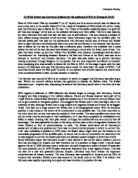To What Extent did the Industrialised Nature of WW1 determine its cause and outcome?
To What Extent did the Industrialised Nature of WW1 determine its cause and outcome?
It is fair to say that World War One was unlike any war before in history. The sheer scale of the war, both in terms of casualties and territories, was like nothing that had been seen before or indeed predicted. In fact, as the war progressed, so concerned were the figures leading the various empires for the duration of the war that they began to calculate terms for victory based on national birth rates to replace the losses. But why was this war so unbelievably different from those before it?
To explain this we must look at Britain and Europe before the war. From the mid eighteenth century to the twentieth century (and some would argue that it continues to this day) industry and agriculture experienced dramatic changes that revolutionised production and supply. In farming, crop rotations were introduced to allow for efficient cultivation and harvesting, and with new knowledge livestock could be bred for optimum food quality. New methods were introduced in industry to supply the increasing demand for goods and services. Although machines in factories had been common at the beginning of the 1700’s, improvement after improvement was introduced and with the inclusion of steam power to increase output, supply (and profits) skyrocketed. These changes not only affected economics, but also society itself. No longer were products such as crockery and glassware available only to the upper classes, but with mass production more ordinary people could expect to be able to buy products like these and more. With advances in industry came advances in transport, which greatly influenced mobility before and during the war. But some of the most profound changes were political. Nations now had tremendous killing power, and the ability to place forces wherever they were needed.







